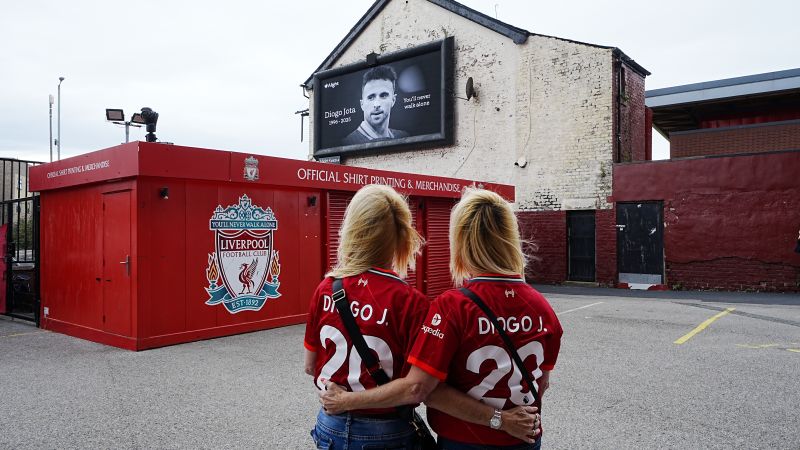
There is a Diogo Jota performance that many Liverpool supporters will remember above all others. In October 2022, with the Reds struggling for form, Jota and his teammates faced a formidable Manchester City side, which would go on to win a historic treble that season. Just a month before the 2022 men’s World Cup—a tournament Jota later described as “one of his dreams”—many players might have opted for caution to avoid injury. Not Jota. The Portuguese forward, despite not scoring or assisting, played 100 relentless minutes, winning the ball back on numerous occasions. Liverpool emerged victorious, 1-0, but Jota’s tireless performance ended with an injury in the final minute, costing him a place in the World Cup.
With the tournament set to come around again next year, Jota would likely have finally fulfilled that dream in 2026. Tragically, that opportunity, along with the chance to experience life as a young father and newlywed, was cruelly snatched from the 28-year-old on Thursday morning when he and his brother, André Silva, died in a car crash in northwestern Spain.
Hunger and Bravery
Perhaps Jota could have avoided injury against Manchester City had he stayed out of difficult tackles. But that was not his style. “The way he played the game was full of this sort of scampering energy. He would hunt the ball down aggressively, and he’d hunt space down aggressively,” Neil Atkinson, CEO and host of The Anfield Wrap, told CNN Sports’ Amanda Davies. Jota’s technical gifts, while apparent, were not on the level of some of his teammates. However, his willingness to fight endeared him to fans, making it difficult to attend a Liverpool game without hearing the crowd’s famous song for him.
“They loved that work ethic, that sheer desire, and the fact that he had almost a sense of mischief about him in the manner of his goals as well,” Atkinson said.
Jota was vocal about his philosophy of hard work on the pitch. “As a fan—I was a fan myself—you want to see a player fighting for the club, for the badge that they both love,” he said in a video released by Liverpool following the news of his death. But his tenacity extended beyond the field. As a young player struggling for games at Atlético Madrid, Jota bravely joined Wolverhampton Wanderers, then in the Championship, England’s second tier. His bravery was rewarded, eventually leading to his signing with Liverpool in 2020.
Collective Spirit
At Liverpool, Jota found kinship with a city that, like him, has often had to fight. In 1981, following riots in Liverpool due to tensions between police and the Black community, then British Prime Minister Margaret Thatcher was advised by her finance minister to pursue a policy of “managed decline” for the city. According to the minister, spending public money on Liverpool would be like “trying to make water flow uphill.”
Eight years later, the Hillsborough disaster claimed 97 lives at an FA Cup semifinal, and the city once again faced the establishment’s brunt. Despite tireless campaigning by victims’ families, it took until 2016 for an inquest to rule that those who died were unlawfully killed and that fan behavior did not contribute to the disaster.
Less than six weeks ago, a car rammed into a crowd at a parade celebrating Liverpool’s Premier League title win, injuring dozens, including children. In the face of this latest tragedy, the city will once again come together to grieve. “The only way to get through this is to get through it together,” Atkinson said. The importance of collectiveness was echoed by another Liverpool fan, Sally, who told CNN Sports’ Matias Grez outside Anfield, “You stick together because that’s the only way it’s going to work. That’s the community spirit. It’s not just Liverpool, it’s Everton as well. Rivalries aside, times like this everyone comes together. It doesn’t matter who you support.”
Among the hundreds of scarves, flowers, and messages left for Jota and his brother outside Anfield, items laid by fans of Everton, Liverpool’s local rival, were visible.
Home Away from Home
To say that Jota—a man who grew up in a small town outside Porto, 886 miles (1426 kilometers) away—fit well in Liverpool would be an understatement. That affinity extended to some of the less-Portuguese pastimes. In tribute posts on social media, former teammates Andy Robertson and Caoimhín Kelleher both referenced their surprise at Jota’s enjoyment of darts and horse racing, with Robertson even jokingly referring to him as “Diogo MacJota.”
“You could relate to him,” Sally, the Liverpool supporter, said. “He was very humble. He wasn’t showy-offy. He was just very much a family man. I think that’s what relates everyone in the city to him, because we’re all like a family.”
The funeral for the 28-year-old and his brother took place in their hometown of Gondomar on Saturday morning. The pain their family, Jota’s wife, and their three children are experiencing far exceeds that of those who marveled from afar at his performances on a soccer pitch. But it is a testament to Jota’s spirit and tenacity that Liverpool too is grieving the loss of one of its most beloved sons.






